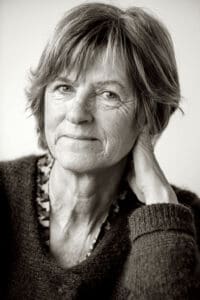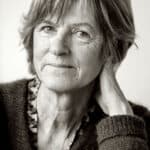Miriam Van hee
Belgium

Miriam Van hee, Belgium. Jerzy Koch
Miriam Van hee, selected poems
The first book by Flemish author Miriam Van hee that was published abroad was a selection of poems edited and translated into Polish by Jerzy Koch. Komunikacja miejska (Witryna Artystów, 1992) contained the poet’s early works. In the volume from the EPF – 2024 Nominations series, we will find poems from Van hee’s mature period, selected and translated by Jerzy Koch.
Miriam Van hee’s poems do not vociferously protest against enslavement; they are free from loud ideological choices. Yet in the tumultuous world of today, the poet’s slightly subdued yet moving voice sounds more forcibly than if she were screaming. Miriam Van hee speaks about a personal experience of the world and the need to make individual choices even after disappointment and disillusionment. Her senses, hugely sensitive to nature, harmonize with a penetrating gaze at human existence, where our longings and imperfections, limitations and looking for balance create the main trajectories of poetic reflection.
For Van hee, poetry is a form of philosophizing, and the author deepens her reflection by discovering internal and external realities, defining the limits of being human and experiencing said limits, which are sometimes accepted but regularly overcome. Experiencing reality and being disappointed therein give rise to the subtle anecdotal nature of her poems, which coincide with an existential reverie, pondering on the world and the order of being.
A selection of poems
Miriam Van hee

Miriam Van hee (b. 1952) is a poet, translator and graduate of Slavonic studies, member of the Royal Flemish Academy for Dutch Language and Literature. She published ten poetry books and one collection of selected poems published by De Bezige Bij, a prestigious Amsterdam-based publishing house. Van hee’s works have received numerous awards, including the Best Poetry Debut of East Flanders award (1977), Jan Campert Prize (1988), Dirk Martens Prize (1995), Cultural Award of the Flemish Community in Belgium (1998), Herman De Coninck Prize (2008, jury and audience award), “Ultima” Literary Award of the Flemish Community (2018). Van hee was invited to many poetry festivals abroad, including Colombia, Peru, South Africa and many European cities. In 2011, she completed a writers’ residency stay in Villa Decius, Krakow. In 2014, she was invited to the House of Literature of the Estonian Writers’ Association in Käsmu and in 2016, to the Comacina island. In 2008, Polish composer Piotr Moss composed music for a string quarter to Van hee’s texts, and the recording of said composition was published in 2013: Piotr Moss – Chagall for strings – Opium String Quartet (CD ACCORD).
Jerzy Koch

Jerzy Koch is a translator, poet and professor employed at the Adam Mickiewicz University in Poznań (since 1997), previously associated with the University of Wrocław (1985–2011); he is also an associate professor at the Stellenbosch University, South Africa. He lectures in Dutch and South African literature, and his research focuses on the reception of translated literature, cultural transfer, (post)colonial literature and literary historiography. Since 1985, he has published translations of Dutch literature (e.g. Hugo Claus, Herman de Coninck, Gerrit Kouwenaar, Lucebert, Harry Mulisch, Multatuli, Leonard Nolens, Marieke Lucas Rijneveld, Paul Rodenko, and Felix Timmermans). In 1995, he received the Dutch M. Nijhoff award for his translations of Dutch literature into Polish, particularly for his translation of Eduard Douwes Dekker’s (Multatuli’s) anticolonial novel Max Havelaar. In 2022, his translation of Marieke Lucas Rijneveld’s novel The Discomfort of Evening, winner of the International Booker Prize (2020), was shortlisted for the Gdynia Literature Award. Koch also translates South African literature from Afrikaans (Breyten Breytenbach, Antjie Krog, Etienne Leroux, Willma Stockenström).

